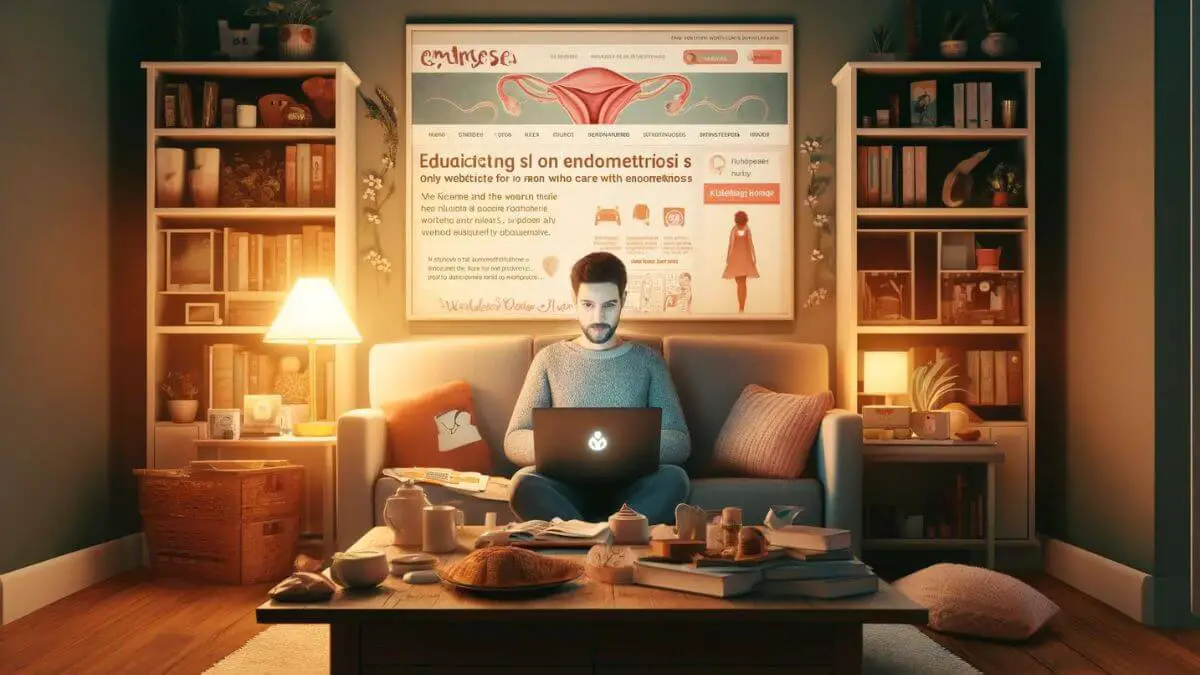The Only Website for Men Who Care for Women with Endometriosis
Have you ever heard of any endometriosis support information given to us – blokes? No, I bet you didn’t. Worry Head is the only website for men who care for women with endometriosis created by a man – me. It’s much needed in the vast endo landscape in terms of relationships because even though many women get marginalized by society and the medical community, they still get more support than us.
As I reflect on my journey as a husband, many feelings come up. I’m filled with love, compassion, and a desire to help. This journey has touched me deeply, and I know others feel the same.
It began when my wife was diagnosed with endometriosis. The pain she went through was intense. She faced many surgeries and a lot of emotional struggles due to her chronic illness.
But that wasn’t all. Sarah also deals with fibromyalgia, anxiety, OCD, and depression daily. We’ve had many sleepless nights and endless doctor visits. Still, our love for each other stays strong.
One day, Sarah suggested something shocking. She thought I’d be happier with someone else, someone without her health issues. She didn’t see how committed I was or how strong our bond was.
This moment made me see something important. The role of male caregivers is often not talked about enough. We, as partners, face our own set of challenges in this journey.
That’s why I created a website just for men who care for women with endometriosis. It’s a place where we can find understanding, support, and a sense of community. We’re here to share our struggles and our commitment to be the best caregivers.
The goal of this website is to help and empower us. It offers the resources, information, and advice we need. Together, we can learn to support our partners better, fight for their care, and improve life for both of us.
So, if you’re just starting this journey or have been on it for a while, remember you’re not alone. We, as male caregivers, have a strong bond. Together, we can truly make a difference.
Join me in this journey of love, compassion, and empowerment. Let’s change the story and redefine our role as caregivers. Together, we can help women with endometriosis.
- Understanding Endometriosis as a Man
- What Are the Struggles of Men Who Care for Women with Endometriosis?
- Worry Head Is the Only Endometriosis Website for Men
- The Role of Men in Managing Endometriosis as Partners
- Share Your Story with Worry Head and Inspire Others
- The Challenges Faced by Male Caregivers
- Personal Stories of Struggle and Support
- Coping Strategies for Male Caregivers
- Resources for Male Caregivers
- The Importance of Communication
- Advocating for Better Care and Support
- Finding Support and Community
- Education and Empowerment
- Supporting Men's Emotional Well-being
- Overcoming Stigma and Misconceptions
- Moving Towards Empowered Caregiving
- Source Links for The Only Website for Men Who Care for Women with Endometriosis
Understanding Endometriosis as a Man
As male caregivers, getting the full picture of endometriosis’ impact on our partners is tough. But, by diving deep into what endometriosis is, we become better supporters. We’ll look at the physical and emotional hurdles our partners face and how we can help.
If you want to learn more about endometriosis, I wrote an “Endo-Tool, Endometriosis for Men” e-Book.
You can get the 1st Chapter of the e-Book for FREE, and if you like it, you’ll get a Whopping 33% Discount on the Whole Book, plus discounts on other helpful tools. You have nothing to lose but a lot to gain!
The first chapter alone contains all the comprehensive medical knowledge about endometriosis, including:
- What is endometriosis?
- What are the symptoms?
- What causes endometriosis?
- What does endometriosis look like?
- What are the stages?
- What are the types?
- What is adenomyosis and how is it related to endometriosis?
- Why do some women develop severe endo and others don’t?
- Does endometriosis cause infertility?
- How is endometriosis diagnosed?
- Do types and stages affect the treatment?
- Recurrence of endometriosis after excision surgery.
FREE Chapter of “Endo-Tool”
Endometriosis e-Book for Men
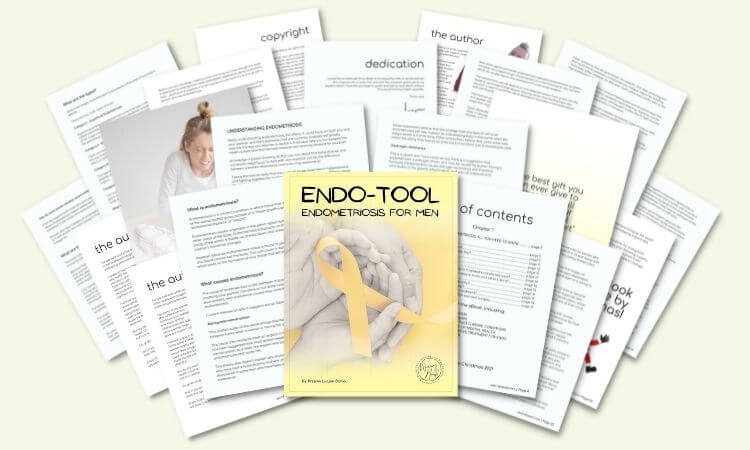
Understanding the Physical Challenges
Endometriosis is where tissue, like the uterus lining, grows outside it. It causes pain, swelling, and sometimes fertility problems. It’s key we learn about its symptoms and treatments.
This knowledge helps us grasp the pain and discomfort our partners endure.
Acknowledging the Emotional Impact
Endometriosis impacts women emotionally too. It brings frustration, sadness, and loneliness. As men, it’s vital to offer emotional support and truly listen.
By being there and understanding, we lighten their emotional load.
Educating Ourselves
To really support our partners, we need to learn about endometriosis. Finding trustworthy information helps us know about care options and symptom management. This way, we can join in making healthcare choices and push for the best care.
Empathy and Compassion
At its core, understanding endometriosis means being empathetic and compassionate. We have to acknowledge their feelings, listen, and create a space for honest talk. This builds trust and gives the support our partners need in their endometriosis journey.
By learning about endometriosis as men, we become better, compassionate caregivers. Let’s learn, listen, and offer the support our partners deserve.
| Key Points |
|---|
| Understanding the physical and emotional challenges of endometriosis is essential for male caregivers. |
| Educating ourselves about endometriosis enables us to actively participate in our partners’ healthcare decisions. |
| Approaching our partners with empathy and compassion creates a supportive environment. |

What Are the Struggles of Men Who Care for Women with Endometriosis?
Men caring for women with endometriosis often face emotional strain, lack of support, and challenges in understanding the condition.
Caring for a partner with endometriosis, a complex and often debilitating condition, can be a challenging and emotionally taxing experience for men. They may grapple with feelings of helplessness, frustration, and anxiety as they witness their partners suffer from chronic pain, infertility issues, and the myriad of symptoms associated with endometriosis.
The lack of a comprehensive support system and resources tailored to the needs of male partners can exacerbate these challenges. Furthermore, the societal expectations placed on men to remain strong and stoic can prevent them from seeking the support they need, leading to feelings of isolation.
Men may also struggle to understand the full scope of the condition and how to effectively support their partner, both emotionally and in navigating the healthcare system.
This can put a strain on the relationship and on the mental health of both partners. Recognizing and addressing these struggles is crucial in fostering a supportive environment for both the individuals living with endometriosis and their caring partners.
Why There Is No Endometriosis Guide Tailored To Men?
The absence of endometriosis guides for men may stem from historical medical focus on women and societal norms around men’s roles in healthcare.
Endometriosis has traditionally been viewed through a medical lens that centers on women’s health, leading to a significant gap in resources and support specifically tailored for men. This oversight can be attributed to a combination of factors, including historical biases in healthcare research that prioritize women’s experiences with the condition and societal expectations about gender roles in caregiving.
Men are often expected to be the support system rather than active participants needing guidance and understanding in the care process. Additionally, the lack of awareness and understanding of endometriosis as a whole contributes to the scarcity of resources available to men.
This gap underscores the need for a more inclusive approach to health education and support services that recognize the vital role men play in the caregiving and support network for partners with endometriosis. Expanding the narrative to include men’s experiences and challenges can lead to the development of comprehensive guides and resources that cater to their specific needs, ultimately fostering a more supportive and informed environment for everyone affected by the condition.
Why Are Men Overlooked By Endometriosis Community?
Men are often overlooked by the endometriosis community due to the condition’s direct impact on women and traditional gender roles in caregiving.
The endometriosis community’s primary focus is understandably on women, who are directly affected by the condition. This focus, while necessary, can inadvertently lead to men being overlooked, despite their significant role as partners, caregivers, and supporters.
Traditional gender roles and societal norms that dictate caregiving dynamics often undervalue or ignore the emotional and practical support men provide. Furthermore, the lack of visibility and dialogue about men’s experiences and challenges in supporting partners with endometriosis contributes to their marginalization within the community.
This oversight can prevent men from accessing the information, support, and resources they need to effectively care for their partners and manage their own emotional well-being.
Addressing this gap requires a more inclusive approach that acknowledges and supports the roles of all individuals involved in the care and support network for those with endometriosis, fostering a more comprehensive and empathetic community.
What Are the Challenges Men of Endo-Warriors Face?
Men supporting endo-warriors face challenges like emotional distress, lack of support, and understanding of the condition’s complexities.
Supporting a partner with endometriosis, or being an “endo-warrior’s” partner, presents unique challenges for men. These include emotional distress from witnessing their partner’s suffering without being able to alleviate it directly, leading to feelings of helplessness and frustration.
The complex and often unpredictable nature of endometriosis can make it difficult for men to understand the full scope of the condition, its symptoms, and its impact on their partner’s physical and emotional well-being. This lack of understanding can hinder their ability to provide effective support.
Additionally, there is a notable lack of resources and support networks specifically aimed at men in this role, which can leave them feeling isolated and without guidance on how to navigate the challenges they and their partners face. Societal expectations that men should remain stoic and strong can further exacerbate their sense of isolation, making it difficult for them to express their own needs and vulnerabilities.
Overcoming these challenges requires increased awareness, education, and the creation of supportive resources that recognize the vital role men play in the lives of endo-warriors.
Why Do Many Men Leave Women with Endometriosis?
Men may leave partners with endometriosis due to the strain of chronic illness on relationships, lack of understanding, and emotional distress.
The chronic and debilitating nature of endometriosis can put a significant strain on relationships, which may lead some men to leave their partners. The condition can lead to physical and emotional challenges, including chronic pain, fertility issues, and the impact on a couple’s intimacy, which can be difficult for both partners to navigate.
Men may struggle with understanding the complexity and unpredictability of the disease, leading to feelings of helplessness, frustration, and emotional distress.
Additionally, the lack of societal support for men in caregiving roles and the absence of adequate resources to educate and guide them through their partner’s condition can exacerbate these feelings.
Relationships may also suffer due to the financial burden of ongoing medical treatments and the impact of the disease on social activities and lifestyle.
Without proper communication, support, and understanding of the disease, these challenges can become overwhelming, leading some men to feel that leaving the relationship is their only option. Addressing these issues requires increased awareness, education, and support for both partners to navigate the complexities of endometriosis together.

Worry Head Is the Only Endometriosis Website for Men
Worry Head is a unique platform dedicated to supporting men whose partners are affected by endometriosis.
Worry Head stands out as a pioneering website specifically designed to address the needs of men who are supporting their partners through endometriosis.
Recognizing the lack of resources tailored for men in this context, Worry Head fills a significant gap by offering guidance, support, and information aimed at helping men understand endometriosis, its impact on their partners, and how to navigate the challenges it presents in their relationships.
The platform provides educational content, personal stories, and practical advice to foster empathy, effective communication, and emotional support.
By focusing on the often-overlooked perspective of male partners, Worry Head aims to build a supportive community where men can learn, share experiences, and find solace in knowing they are not alone in their journey. This approach not only aids men in becoming more informed and supportive partners but also contributes to raising awareness about endometriosis and its broader impact on relationships and families.
My Personal Experience with Wife’s Endometriosis
Navigating my wife’s endometriosis journey has been a profound and transformative experience for both of us.
My personal journey with my wife’s endometriosis has been a path of learning, empathy, and resilience. Witnessing her struggle with the pain and challenges of endometriosis, I was propelled into a role I never expected: that of a caregiver, advocate, and unwavering supporter. This experience has underscored the complexities of endometriosis, not just as a physical condition but as an emotional and relational one as well.
The journey has been fraught with obstacles, from diagnosis delays to ineffective treatments and the pervasive sense of helplessness that comes from seeing a loved one in pain. Yet, it has also been a journey of growth. I’ve learned the importance of empathy, the value of informed support, and the necessity of open communication in navigating the ups and downs of this condition.
This personal experience has driven me to seek out and provide support for others in similar situations, fostering a community where shared experiences and knowledge can offer solace and strength to those affected by endometriosis, directly or indirectly.
Why I Wrote “Endo-Tool: Endometriosis for Men” Book
I authored “Endo-Tool: Endometriosis for Men” to enlighten and support men navigating their partner’s endometriosis journey.
The motivation behind writing “Endo-Tool: Endometriosis for Men” stemmed from a personal journey and the realization of the significant gap in support and resources for men whose partners are battling endometriosis. Recognizing the challenges and emotional toll that endometriosis can impose on relationships, and the lack of targeted guidance for men, I felt compelled to share insights, practical advice, and empathy from a male perspective.
This book is intended to serve as a comprehensive guide to help men understand endometriosis, its effects on their partner, and how it can impact their relationship. It aims to equip men with the tools and knowledge needed to become supportive partners, effective caregivers, and advocates for their loved ones.
Addressing topics such as communication, emotional support, and navigating the healthcare system, “Endo-Tool: Endometriosis for Men” seeks to build a bridge of understanding and empathy, fostering stronger, more supportive relationships in the face of this challenging condition.
7 Lessons from Loving a Woman with Endometriosis
Loving a woman with endometriosis teaches patience, empathy, and the value of true partnership.
- Empathy is Key: Understanding and empathizing with your partner’s pain and emotional struggles is crucial. It’s about more than just acknowledging their pain; it’s about genuinely trying to understand their experience and offering support without judgment.
- Patience is Vital: The unpredictable nature of endometriosis means that plans may change last minute, and symptoms can flare up unexpectedly. Learning to be patient and flexible is essential in supporting your partner through their ups and downs.
- Communication Opens Doors: Open and honest communication helps in navigating the complexities of endometriosis together. It’s important to discuss feelings, frustrations, and needs openly to maintain a healthy relationship.
- Educate Yourself: Taking the time to learn about endometriosis, its symptoms, treatments, and impacts can make a significant difference. Being informed allows you to better support your partner and advocate for their health.
- Support Networks are Crucial: Both partners need support. Finding communities, either online or in person, where experiences and strategies can be shared is beneficial for both the individual with endometriosis and their partner.
- Intimacy Beyond Physical: Endometriosis can affect physical intimacy, but it’s important to find other ways to maintain a close bond. Emotional and affectionate support can also strengthen your connection.
- Self-Care is Important for Both: While supporting your partner, it’s essential not to neglect your own well-being. Engaging in self-care practices ensures that you are mentally and emotionally equipped to be there for your partner.
The Need for Men’s Awareness about Endometriosis
Raising men’s awareness about endometriosis is crucial for fostering empathy, support, and effective partnership in managing the condition.
The need for increased awareness among men about endometriosis is paramount, as it plays a critical role in shaping how men perceive, understand, and respond to this condition.
Enhanced awareness can lead to a deeper empathy for the challenges faced by women with endometriosis, fostering a more supportive and understanding environment. It empowers men to be proactive partners, advocating for and supporting their loved ones in navigating the complexities of diagnosis, treatment, and daily management of endometriosis.
Moreover, educating men about endometriosis can break down the stigma and misconceptions surrounding the condition, encouraging open discussions and reducing feelings of isolation for those affected. It also prepares men to better handle the emotional and physical implications of endometriosis on their relationships, promoting a partnership approach to overcoming obstacles.
Ultimately, raising men’s awareness about endometriosis is not just about providing them with information; it’s about cultivating compassion, resilience, and a shared commitment to facing the challenges of endometriosis together.
Why Websites Like Worry Head Are the Answer?
Websites like Worry Head provide crucial support and resources for men involved in the care of partners with endometriosis, fostering understanding and empathy.
Websites such as Worry Head address a significant gap in resources and support for men who are navigating the challenges of their partner’s endometriosis. They offer a dedicated space where men can access information specifically tailored to their experiences and needs, which is often lacking in general health resources.
By providing insights into endometriosis from a male perspective, these platforms help men to better understand the condition, its impact on their partner, and how they can effectively contribute to managing its effects.
Furthermore, these websites create a community where men can share their experiences, challenges, and solutions, reducing feelings of isolation and enabling them to learn from others in similar situations. They also offer practical advice on communication, care, and advocacy, empowering men to be supportive partners.
Websites like Worry Head play a crucial role in raising awareness about endometriosis among men, promoting empathy, and encouraging a proactive approach to supporting their partners, ultimately contributing to stronger, more understanding relationships.
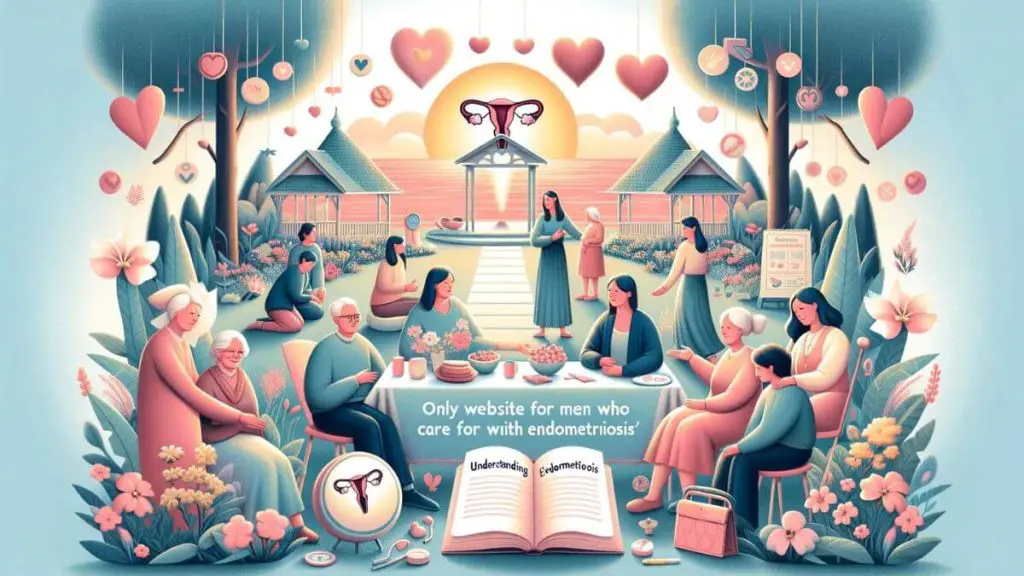
The Role of Men in Managing Endometriosis as Partners
Men play a crucial supportive role in managing endometriosis, offering emotional support, understanding, and advocacy for their partners.
As partners, men have a significant role in managing endometriosis alongside their loved ones. This role encompasses emotional support, providing a listening ear and a shoulder to lean on during challenging times. Understanding the condition is key; men can educate themselves about endometriosis to better grasp what their partner is experiencing, leading to more empathetic and effective support.
Practical support is also vital, such as accompanying partners to medical appointments, assisting with daily tasks during flare-ups, and helping navigate treatment options. Men can advocate for their partner’s health needs, ensuring they receive the attention and care required.
Moreover, maintaining open and honest communication is essential for addressing the emotional and physical impacts of endometriosis on the relationship. By being involved and proactive, men can help lessen the burden of endometriosis, making the journey less isolating for their partners and contributing to a supportive, understanding partnership.
How Can Men Contribute to Raising Endometriosis Awareness?
Men can contribute to raising endometriosis awareness by educating themselves, sharing information, and advocating for better healthcare and support.
Men can play a pivotal role in amplifying awareness about endometriosis by first educating themselves on the condition, its symptoms, and its impacts. Armed with knowledge, they can then engage in conversations within their networks, dispelling myths and spreading accurate information. Sharing personal stories, if applicable, can add a powerful dimension to raising awareness, making the condition more relatable and understood.
Additionally, men can advocate for better endometriosis research, treatment, and support services by participating in awareness campaigns, supporting fundraisers, and engaging with policymakers. In workplaces and social settings, men can promote inclusive policies and practices that accommodate individuals affected by endometriosis, contributing to a more supportive environment.
By actively participating in these efforts, men not only contribute to a broader understanding and recognition of endometriosis but also foster a culture of empathy and support, encouraging others to join in raising awareness about this critical women’s health issue.
How Can Men Be Effective Advocates for Their Women?
Men can be effective advocates for their partners by being informed, communicative, and proactive in supporting their health and well-being.
To effectively advocate for their partners, men should start by educating themselves about their partner’s condition, understanding both the medical aspects and the personal impact it has on their partner’s daily life. This knowledge equips them to engage in informed discussions with healthcare providers and to ask the right questions, ensuring their partner’s concerns are addressed and their needs are met.
Communication is key; men should actively listen to their partners, validating their experiences and ensuring their voices are heard in healthcare settings. Being present at medical appointments can offer emotional support and serve as an additional avenue for advocacy, helping to navigate the complexities of treatment options and decisions.
Men can also advocate by raising awareness about the condition, challenging stigma, and contributing to a broader dialogue about women’s health issues. By using their platforms, whether in personal, professional, or social settings, to share information and advocate for better research and treatment, men can make a significant impact in the lives of their partners and the wider community affected by similar conditions.
Share Your Story with Worry Head and Inspire Others
Sharing your journey with Worry Head can empower and uplift others facing similar challenges, creating a ripple effect of hope and solidarity.
By contributing your personal narrative to a platform like Worry Head, you provide a beacon of light for others navigating the complex waters of endometriosis with their partners. Your story can offer invaluable insights, practical advice, and, most importantly, a sense of understanding and camaraderie. It’s about more than just recounting experiences; it’s about weaving a tapestry of shared humanity, resilience, and love.
Each narrative has the power to validate someone else’s feelings, offer strategies that might ease another’s burden, and perhaps most crucially, remind others that they are not alone in their struggles.
In the realm of chronic conditions like endometriosis, where isolation and misunderstanding are all too common, your story can be a lighthouse guiding others toward a community where their experiences are seen, heard, and valued. So, by sharing your journey, you’re not just narrating your life; you’re contributing to a larger narrative of hope, strength, and collective resilience.
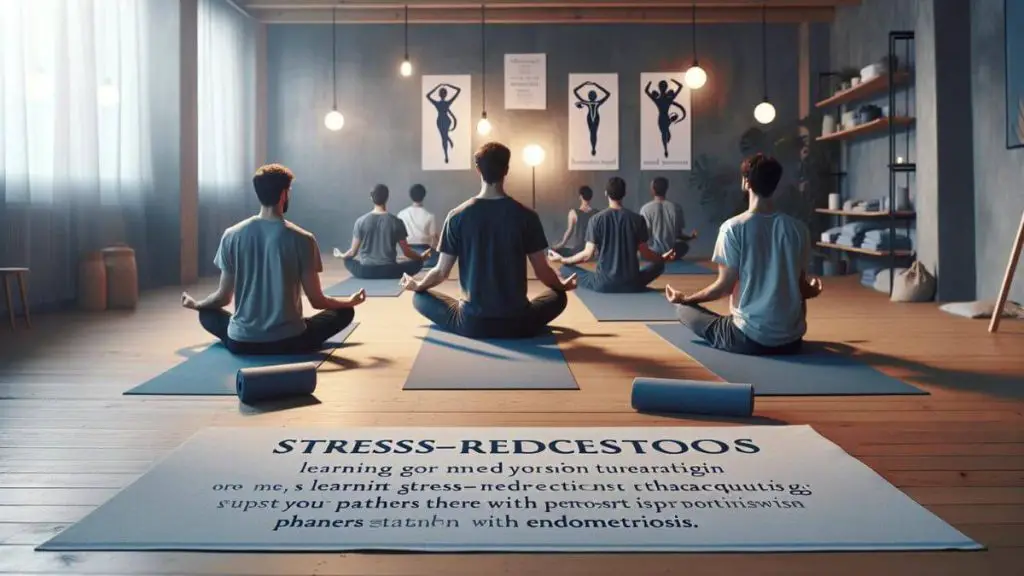
The Challenges Faced by Male Caregivers
We, as male caregivers, face unique challenges when helping our partners with endometriosis. It’s important to see how this condition affects both our partners and us. Seeing our loved ones suffer from chronic pain and other issues is tough. We feel many things like empathy, frustration, and helplessness.
It’s also key to understand how endometriosis impacts our own lives. Trying to balance caregiving, work, and personal life is hard. We’re always trying to support our partner well while also looking after ourselves.
A big issue for male caregivers is the lack of support just for men. There’s a lot of help for women with endometriosis, but not much for their male supporters. We need resources that recognize our role and help us support our partners better.
To tackle these issues, we need access to resources and support designed for us. By working with organizations focused on endometriosis, our needs can be acknowledged. This helps us get the help and advice we need.
Supporting Men’s Role in Endometriosis Care
Helping male caregivers is crucial for them and their partners. Men’s active involvement can greatly improve life for women with endometriosis. By giving education, resources, and advice, we can help men become strong and caring partners in handling endometriosis.
By focusing on the challenges male caregivers face and giving them the right support, we can make sure women with endometriosis get great care. This also helps the well-being of their male partners.
| Partners Supporting Endometriosis | Men’s Role in Endometriosis Care | Endometriosis Resources for Men |
|---|---|---|
| Empower male caregivers to provide emotional and physical support to their partners. | Encourage active participation in healthcare decisions and treatment management. | Provide resources that offer information, guidance, and a supportive community for male caregivers. |
| Offer tools for effective communication and understanding of the challenges faced by women with endometriosis. | Provide support and guidance on managing the emotional toll of caregiving. | Ensure access to organizations and online platforms that address the unique needs of male caregivers. |
| Promote awareness of the importance of male caregivers in the endometriosis community. | Highlight the positive impact of male involvement in improving endometriosis care and support systems. | Collaborate with healthcare professionals and advocacy groups to create inclusive resources for male caregivers. |
Personal Stories of Struggle and Support
We share the moving stories of male caregivers helping their partners with endometriosis. These tales reveal the challenges these men face and their big impact on their partners’ lives.
Mark is a caring husband who stays by his wife through her endometriosis struggle. He talks about feeling helpless and frustrated when his wife had flare-ups. Despite this, Mark never gave up. He became her caretaker, offering hope and comfort.
Then there’s David’s touching story of learning and empathy. At first, he didn’t realize how much pain his partner was in. David decided to learn more about endometriosis. He joined groups, read up, and talked to doctors. This helped him see his partner’s true strength. He became her biggest supporter.
These and many other stories underline how important male caregivers are to women with endometriosis. They encourage other men facing the same issues, showing them they’re not alone.
Sharing these stories helps build a community of support among male caregivers. They show us that love, understanding, and commitment can truly change the lives of women with endometriosis.
| Personal Story | Male Caregiver |
|---|---|
| Mark’s Journey: Supporting My Wife’s Battle | Mark |
| Finding Strength: David’s Story of Empathy | David |
Coping Strategies for Male Caregivers
Caring for someone with endometriosis is tough for male caregivers. It’s crucial for men to look after their health and find ways to cope. Here are some helpful tips:
- Seek support: Don’t be shy to ask for help. Talking to friends or joining a support group can be really helpful.
- Practice self-care: Look after your body and mind. Do things that make you happy and relaxed, like sports, meditating, or hobbies.
- Manage stress: Endometriosis can be stressful. Learn healthy ways to deal with stress, like deep breathing, mindfulness, or stress-relief activities.
- Create boundaries: Make sure to have a clear line between caregiving and your personal life. Take time for yourself, fun, and spending quality moments with your partner.
- Educate yourself: Learn about endometriosis. Knowing more about it will help you support and understand your partner better.
- Communicate openly: Talk openly with your partner. Share your feelings, worries, and encourage them to share too. Good communication makes your relationship stronger and more supportive.
- Advocate for your partner: Help your partner with their healthcare. Go with them to appointments, ask questions, and make sure they get the right support.
Remember, helping a partner with endometriosis is a path that needs patience, empathy, and self-care. By looking after yourself, you’ll be more prepared to offer the love and support your partner requires.
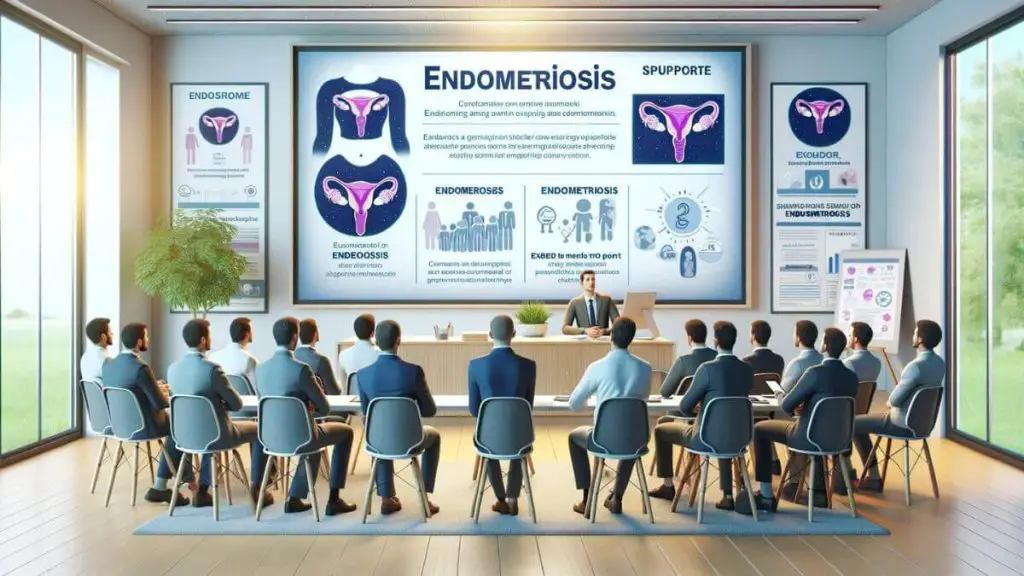
Resources for Male Caregivers
As a man supporting a partner with endometriosis, knowing where to find help is key. This list offers resources and support to assist you in your role. They include information, advice, and a community for understanding and aiding your partner.
1. Websites
Some of these websites offer some information on endometriosis in terms of how to support your partner, but not as much as Worry Head. Still, worth noticing:
- Endometriosis Foundation of America: Educational resources and support networks for men are available here.
- Endometriosis Foundation: It has resources, research updates, and advice tailored for male caregivers.
- Men Against Endometriosis: This platform focuses on awareness and support for men caring for partners with endometriosis.
2. Forums
Some online forums let you connect with other men in similar situations:
- Endometriosis Foundation of America Forum: A place to meet others facing the same challenges of caring for a partner.
- Inspire Endometriosis Support Group: This group allows for discussions and insights from those who truly understand.
3. Helplines
For immediate help or advice, these helplines cater to male caregivers:
- National Suicide Prevention Lifeline: Talks with counselors who offer emotional support in tough times.
- National Sexual Assault Hotline: Confidential support and information on sexual assault, available 24/7.
- National Domestic Violence Hotline: Offers assistance if you or your partner are facing domestic violence.
4. Local Support Groups
Local groups for male caregivers of women with endometriosis provide a secure environment. They help share experiences and find community support.
Remember, you’re not alone as a male caregiver. These resources aim to assist you in supporting your partner. Reach out, connect, and find a support network that empowers your caregiving journey.
The Importance of Communication
Talking well is key when helping a partner with endometriosis. As a man caring for them, it’s important to be open and honest. This makes sure both of you are understood and your needs met.
Good communication strengthens relationships, especially with endometriosis. Listen well to understand your partner’s feelings and needs. This caring way can bring you closer together.
Being patient, kind, and open-minded is essential. Know that your partner’s feelings are important. Open talks and sharing your feelings will make your bond stronger.
Here’s how to improve communication and be there for your partner:
- Ask questions and really listen.
- Show you understand and care about their feelings.
- Go with them to doctor visits and care about their health.
- Learn about endometriosis, its signs, and how to treat it.
- Be patient and kind when they’re in pain or upset.
- Help out with everyday tasks.
Creating a Supportive Environment
Support is not just talking well. It also means making a place where your partner feels okay sharing what troubles them. Here’s how to make a supportive space:
- Talk openly about endometriosis and its effects.
- Show you understand their pain and are there to help.
- Go with them to support groups or therapy.
- Help others understand endometriosis by sharing what you know.
- Plan fun activities to take a break from endometriosis.
Remember, talking well takes time. It needs patience, good listening, and being willing to change. By improving how you communicate, you can make your relationship stronger and support your partner better.
Advocating for Better Care and Support
As male caregivers, we have a special chance to fight for better care for women with endometriosis. By telling our stories and raising our voices, we can help raise awareness, education, and resources.
Endometriosis is complicated and affects millions of women. It’s often misunderstood and not given enough attention. As partners, we see the struggles faced by women with this condition. We can spotlight their struggles, pushing for actions from healthcare, lawmakers, and the public.
Education and Awareness
We can make a big difference by boosting education and awareness about endometriosis. Sharing what we know and our experiences can clear up wrong ideas and build understanding. It’s important to talk about how endometriosis impacts women physically and emotionally, and stress the need for specific care.
Talking to healthcare professionals, we can push for better training on endometriosis. We should encourage them to keep up with new research and treatments. This will help women get the care they need.
Raising Our Voices
Male caregivers offer a unique view on endometriosis and can offer important insights. By telling our stories, we can show healthcare providers why a holistic approach is needed. This approach should include support for partners too.
We can also get the attention of policymakers. By sharing how endometriosis affects women and the support role men play, we can push for changes. These changes should focus on the needs of those living with the condition.
Supporting Each Other
Together, male caregivers can build a supportive community. By linking with others in the same situation, we can share stories, advice, and give emotional support.
Places like online forums, support groups, and social media are great for us to meet, share, and find comfort. These spaces also let us fight for better care and support for women with endometriosis.
| Ways to Advocate for Better Care and Support | Impact |
|---|---|
| Share your story on social media and in online communities | Raise awareness and inspire others to take action |
| Participate in endometriosis awareness events and campaigns | Contribute to the larger movement for change |
| Engage in conversations with healthcare providers, policymakers, and researchers | Influence the shaping of healthcare policies and practices |
| Support local endometriosis organizations and initiatives | Help create resources and services for women with endometriosis |
| Join or create support groups for male caregivers | Provide a safe space for sharing experiences and offering support |
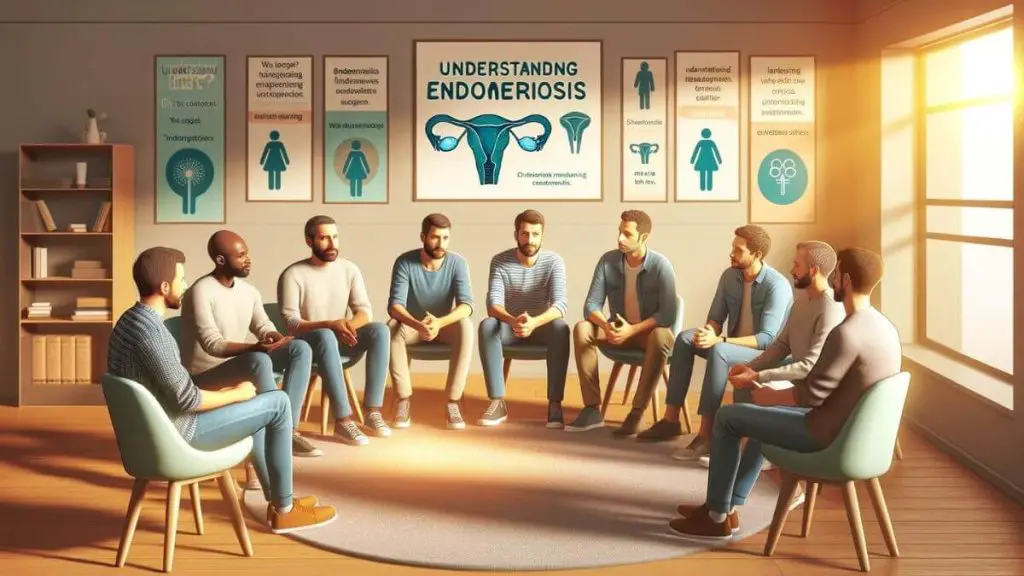
Finding Support and Community
As a male caregiver supporting a partner with endometriosis, finding support is key. It is vital to connect with a community that gets what you’re going through. Here are tips for finding the support you need…
1. Support Groups
Look into local support groups made for male caregivers of women with endometriosis. These groups offer a safe place to talk and relate with others. You’ll find educational resources, guest speakers, and open discussions. This can lead to valuable insights, coping strategies, and strong connections.
2. Online Forums
Check out online forums or boards for male caregivers of people with endometriosis. These allow you to connect globally, offering diverse perspectives on caregiving. You can talk, ask questions, and share your journey. Online forums are great, especially if local resources are scarce.
3. Social Media Communities
Find social media groups or communities for partners of individuals with endometriosis. Facebook groups or Twitter chats are examples. They offer a space for sharing stories, support, and resources. Connecting via social media can ease feelings of isolation and offer ongoing encouragement.
4. Endometriosis Organizations
Many organizations focused on endometriosis provide support for male caregivers. Check their websites and ask about support options like groups or online communities. They also have educational materials to help understand the condition and your caregiving role.
Seeking support as a male caregiver shows strength, not weakness. By connecting with others in similar situations, you’ll find comfort and gain knowledge. This helps you better support your partner in their endometriosis journey.
Education and Empowerment
Learning about endometriosis is crucial for male caregivers. It helps us support our partners better. We understand their physical and emotional struggles through this knowledge.
Knowing about endometriosis turns us into active advocates for our partners’ health. It prepares us to help them through medical visits and decisions. Together, we make informed choices, strengthening our bond.
We understand endometriosis’s impact through resources for male caregivers. This includes effects on fertility and mental health. Our support becomes more empathetic, helping our partners face these challenges.
Empowering Through Knowledge and Awareness
Educational materials for male caregivers are vital. They include websites, brochures, and videos. These resources offer in-depth, useful information.
Joining support groups and forums is beneficial, too. These platforms let us learn from others’ experiences. We can share advice, offering and receiving support from those in similar situations.
Understanding endometriosis helps us raise awareness. By sharing what we know, we support women with endometriosis. This leads to better resources and medical care for them.
Continued Growth and Support
Education for male caregivers is an ongoing journey. Staying updated with endometriosis research is important. This keeps us informed about new findings.
We build a strong support network through our dedication to learning. By sharing our knowledge and experiences, we support women with endometriosis. Together, we work towards better care and awareness.
| Benefits of Education for Male Caregivers |
|---|
| Improved understanding of endometriosis |
| Enhanced ability to provide emotional support |
| Better collaboration in healthcare decisions |
| Increased awareness and advocacy |
| Access to educational resources |
| Building a network of support with other male caregivers |
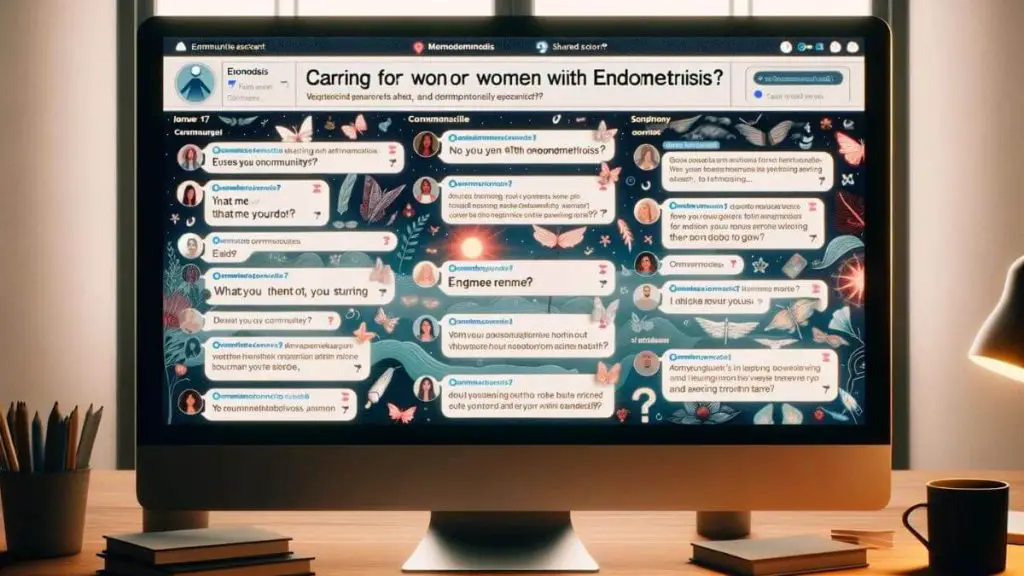
Supporting Men’s Emotional Well-being
Supporting a partner with endometriosis requires you to take care of your own emotions first. It’s vital for male caregivers to look after their mental health and handle stress well. This ensures you can give the best support to your partner. Here are tips to help you cope with emotional challenges…
1. Prioritize Self-care
It’s important to find time for activities that relax and refresh you. Going for a walk, practicing mindfulness, or enjoying hobbies are good ways to take care of yourself. Caring for yourself lets you care better for others.
2. Seek Support
It’s okay to ask for help when you need it. Talk to friends, family, or join support groups for a shoulder to lean on. Sharing your story with people facing similar issues can bring comfort.
3. Communicate Openly
Talk openly with your partner about your feelings, worries, and needs. Through sharing and listening, you strengthen your support for each other. This helps in understanding each other better.
4. Develop Healthy Coping Mechanisms
Find coping methods that suit you, like exercising, relaxation techniques, or journaling. These can ease your stress and help you process emotions. Thus, you remain a firm support for your partner.
5. Access Mental Health Services
If the emotional load gets too heavy, seek professional help. Counseling or therapy can offer the support and advice you need. They guide you in managing emotions and finding coping strategies.
Caring for your emotional well-being supports you and your partner. By taking care of yourself and seeking help when needed, you become a dependable support for your partner in facing endometriosis.
| Supporting Men’s Emotional Well-being |
|---|
| 1. Prioritize self-care |
| 2. Seek support |
| 3. Communicate openly |
| 4. Develop healthy coping mechanisms |
| 5. Access mental health services |
Overcoming Stigma and Misconceptions
Endometriosis often faces stigma and misconceptions, affecting male caregivers too. Men must challenge these ideas and actively support their partners with endometriosis. By understanding and being there for their partners, they can make a big difference.
Being informed is key to fighting stigma. Male caregivers can help by learning about endometriosis and sharing this knowledge. This way, they can break down barriers and create a supportive space for women with this condition.
Male caregivers need access to resources and support. They can find help in support groups, online communities, and materials meant for them. These resources help them support their partners better.
| Myths and Misconceptions | Facts and Realities |
|---|---|
| Endometriosis is just period pain | Endometriosis is a chronic condition that can cause a range of symptoms throughout the menstrual cycle and beyond. |
| Only women get endometriosis | While endometriosis primarily affects assigned female at birth individuals, trans men and non-binary individuals can also experience the condition. |
| Male caregivers don’t have a role in endometriosis care | Male caregivers play a crucial role in providing emotional support, advocating for their partners, and helping with daily tasks during flare-ups. |

Seeking Support and Empowering Men
Fighting stigma takes effort from everyone. Male caregivers can lead by sharing stories, offering information, and pushing for more understanding. This way, they help themselves and their partners.
It’s important to teach men more about endometriosis. This knowledge can help them understand the condition better. It shows them how it affects their partners and how to offer the right support.
Moving Towards Empowered Caregiving
As male caregivers, our role in supporting partners with endometriosis is crucial. We can change their lives by embracing an empowered caregiving approach. This includes advocating, seeking knowledge, and joining their healthcare journey.
Educating ourselves on endometriosis helps us support our partners better. Knowledge lets us provide the care and understanding they need. Together, we can make their environment more supportive.
We do more than just support our partners; we advocate and give strength. It’s time we become active in their healthcare. Let’s raise awareness and support for endometriosis together. By doing so, we can positively impact our loved ones’ lives.


About Me
Hi, I’m Lucjan! The reason why I decided to create this blog was my beautiful wife, who experienced a lot of pain in life, but also the lack of information about endometriosis and fibromyalgia for men…
